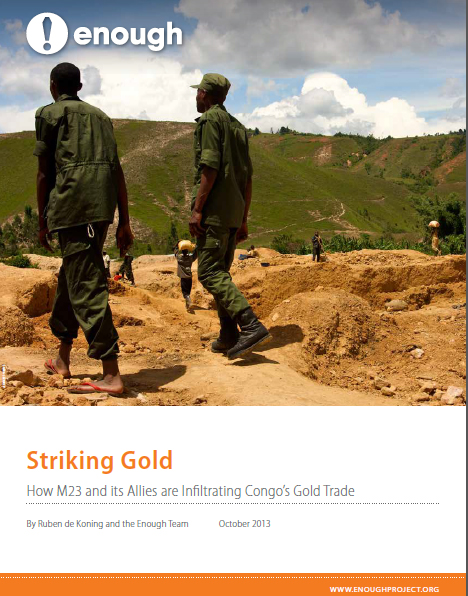
Executive Summary
The M23 rebel group has taken over a profitable part of the conflict gold trade in the east of the Democratic Republic of the Congo, or DRC. It is using revenues from the illicit trade to benefit its leaders and supporters and fund its military campaign by building military alliances and networks with other armed groups that control territory around gold mines and by smuggling gold through Uganda and Burundi. M23 commander Sultani Makenga, who is also allegedly one of the rebels’ main recruiters of child soldiers according to the U.N. Group of Experts on Congo, is at the center of the conflict gold efforts.
This report documents how Makenga and his former co-commander Bosco Ntaganda have led the M23 rebels to work with local armed groups in gold-rich territories to smuggle gold to Uganda via an M23-controlled border crossing, as well as to Burundi, where it is sold internationally. Much of this conflict gold then reaches markets in the United Arab Emirates, or UAE, before going on to banks and jewelers, which together make up 80 percent of global gold demand.
Gold is now the most important conflict mineral in eastern Congo, with at least 12 tons worth roughly $500 million smuggled out of the east every year.4 The other main sources of revenue for armed groups—the “3T minerals” of tin, tungsten, and tantalum—have been steadily reduced due to global conflict-minerals reforms spurred by the U.S. Dodd-Frank financial regulation law, but it is still relatively easy to smuggle gold. Limiting gold smuggling from eastern Congo must therefore become a priority for the international community.
M23 commander Makenga is taking over a gold-smuggling network that former cocommander Bosco Ntaganda built over several years. As military leader of the rebel National Congress for the Defense of the People, or CNDP, a forerunner of M23, Ntaganda in 2011 reportedly brokered several multimillion-dollar gold deals in Goma, DRC; Kampala, Uganda; and Nairobi, Kenya, between Congolese traders and overseas buyers. In 2012, Ntaganda led the newly created M23 as it broke away from the Congolese army, in which its troops had been integrated as part of a peace deal.
Duringhis time with M23 and in the shadow of the peace talks in Kampala between Congo’s government and the M23, Ntaganda facilitated the transfer of an estimated 325 kilos of gold worth $15 million to Kampala for sale, according to the U.N. experts.7 Ntaganda admitted to the U.N. experts that he played a role in one deal in 2011 in Goma, but he never commented on his role in other deals he allegedly brokered.
In March 2013, Ntaganda surrendered to the U.S. Embassy in Rwanda, where he requested to transfer to the International Criminal Court, or ICC, to face charges of war crimes. Since then, Enough Project’s investigations with gold-trade insiders, Congolese civil and military authorities, and members of the Congolese diaspora communities in Kampala and Bujumbura show that Makenga is taking over Ntaganda’s relationships with smugglers in Uganda. Makenga has also mobilized several other military and business players loyal to former CNDP leader Laurent Nkunda to create a business network entirely separate from Ntaganda, according to Enough Project investigations.
To capture a greater share of the gold trade, M23 has built alliances with individuals andarmed groups that control large mines in eastern Congo. These include Sheka Ntabo Ntaberi of the Nduma Defence of Congo, or NDC, armed group in Walikale territory of eastern Congo—the alleged mastermind of the mass rape of more than 300 women, children, and men at Luvungi in 2010. M23 has built ties with Justin Banaloki—whose alias is “Cobra Matata”—the armed leader who is based in Ituri District and was highlighted in the October 2013 National Geographic. M23 is also associated with Congolese army defector and militia leader Maj. Hilaire Kombi in Beni and Lubero territories, according to U.N. experts and Enough Project research. Traversing otherwise hostile ethnic and political divisions, these alliances are based partially on economic gain. Many of those who reap the greatest profits are also those most directly implicated in atrocities and crimes against humanity.

